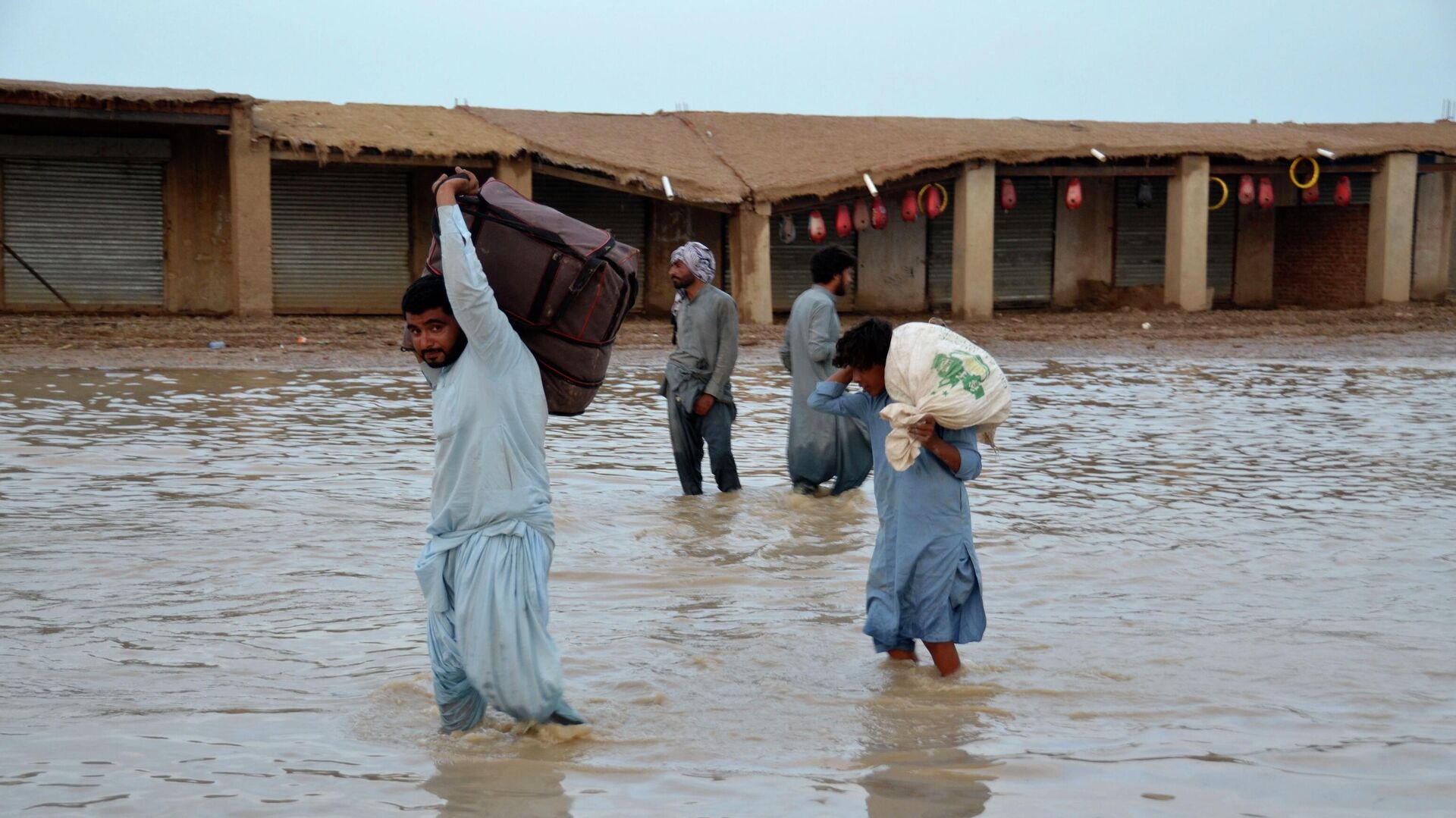https://sputnikglobe.com/20220826/pakistan-declares-national-emergency-as-floods-push-death-toll-to-937---report-1100017515.html
Pakistan Declares National Emergency as Floods Push Death Toll to 937 - Report
Pakistan Declares National Emergency as Floods Push Death Toll to 937 - Report
Sputnik International
According to local authorities, Pakistan saw a 241 percent jump in its monsoon deluge in August as it received 166.8 mm of rain this month, compared to 48mm... 26.08.2022, Sputnik International
2022-08-26T10:55+0000
2022-08-26T10:55+0000
2023-02-14T08:50+0000
pakistan
emergency
floods
flash floods
shehbaz sharif
balochistan
sindh province
national emergency
https://cdn1.img.sputnikglobe.com/img/07e6/08/1a/1100020672_0:0:3093:1739_1920x0_80_0_0_df4a405d5a79c9a1ddff9256d55497b6.jpg
Prime Minister Shehbaz Sharif's government has declared a national emergency in Pakistan as flooding continues to wreak havoc across the country, having already killed 937 and left 30 million people homeless, the Pakistani daily Dawn reported early Friday.According to Pakistan's disaster management agency, a total of 306 people have died in Sindh Province alone, while 234 have been killed in Balochistan Province since June 14, when the first rain-related incident was recorded. Another 185 and 165 people have been killed in Khyber Pakhtunkhwa and Punjab Provinces, respectively.The unprecedented rise in rain showers has led to flash floods across Pakistan, especially in the south, with large parts of Sindh still submerged. Sherry Rehman, Pakistan's Minister for Climate Change, stated that Prime Minister Sharif was personally overseeing rescue and relief operations and a "war room" has been made active at the National Disaster Management Authority (NDMA) for the purpose. Prime Minister Sharif's cabinet called it a "climate-inducted humanitarian crisis of epic proportions." Meanwhile, Sharif appealed for help from international agencies in the hour of crisis.In 2010, Pakistan had faced similar rainfall, leading to floods in the Khyber Pakhtunkhwa, Sindh, Punjab, and Balochistan regions. As per official estimates, nearly 2,000 people were killed in that deluge with Khyber Pakhtunkhwa experiencing large-scale devastation. More than 90 percent of the deaths reported during the 2010 floods took place in this province.On the economic front, the damages to crops and roads, railways, and other infrastructure have been pegged at $4.5 billion.
pakistan
balochistan
sindh province
Sputnik International
feedback@sputniknews.com
+74956456601
MIA „Rossiya Segodnya“
2022
Pawan Atri
https://cdn1.img.sputnikglobe.com/img/07e5/05/12/1082926219_0:0:358:358_100x100_80_0_0_aca1d9bdccc7af990e49b4511ee80344.png
Pawan Atri
https://cdn1.img.sputnikglobe.com/img/07e5/05/12/1082926219_0:0:358:358_100x100_80_0_0_aca1d9bdccc7af990e49b4511ee80344.png
News
en_EN
Sputnik International
feedback@sputniknews.com
+74956456601
MIA „Rossiya Segodnya“
Sputnik International
feedback@sputniknews.com
+74956456601
MIA „Rossiya Segodnya“
Pawan Atri
https://cdn1.img.sputnikglobe.com/img/07e5/05/12/1082926219_0:0:358:358_100x100_80_0_0_aca1d9bdccc7af990e49b4511ee80344.png
pakistan, emergency, floods, flash floods, shehbaz sharif, balochistan, sindh province, national emergency
pakistan, emergency, floods, flash floods, shehbaz sharif, balochistan, sindh province, national emergency
Pakistan Declares National Emergency as Floods Push Death Toll to 937 - Report
10:55 GMT 26.08.2022 (Updated: 08:50 GMT 14.02.2023) According to local authorities, Pakistan saw a 241 percent jump in its monsoon deluge in August as it received 166.8 mm of rain this month, compared to 48mm during the preceding years. The situation is particularly alarming in Balochistan and Sindh provinces, which experienced a 784 and 496 percent rise in showers respectively.
Prime Minister Shehbaz Sharif's government has declared a national emergency in Pakistan as flooding continues to wreak havoc across the country, having already killed 937 and left 30 million people homeless, the Pakistani daily Dawn reported early Friday.
According to Pakistan's disaster management agency, a total of 306 people have died in Sindh Province alone, while 234 have been killed in Balochistan Province since June 14, when the first rain-related incident was recorded. Another 185 and 165 people have been killed in Khyber Pakhtunkhwa and Punjab Provinces, respectively.
The unprecedented rise in rain showers has led to flash floods across Pakistan, especially in the south, with large parts of Sindh still submerged.
Sherry Rehman, Pakistan's Minister for Climate Change, stated that Prime Minister Sharif was personally overseeing rescue and relief operations and a "war room" has been made active at the National Disaster Management Authority (NDMA) for the purpose.
"Pakistan is going through its 8th cycle of monsoon; normally the country has only three to four cycles of [monsoon] rain," Rehman said during a press conference in the national capital Islamabad. "Data suggests the possibility of the re-emergence of another cycle in September."
Prime Minister Sharif's cabinet called it a "climate-inducted humanitarian crisis of epic proportions."
Meanwhile, Sharif appealed for help from international agencies in the hour of crisis.
"The ongoing rain spell has caused devastation across the country. The losses, though yet to be documented, are comparable to the flash floods of 2010. Grateful to the international community for their sympathies, condolences and pledges of support. Together we will build back better," he wrote on Twitter.
In 2010, Pakistan had faced similar rainfall, leading to floods in the Khyber Pakhtunkhwa, Sindh,
Punjab, and Balochistan regions.
As per official estimates, nearly 2,000 people were killed in that deluge with Khyber Pakhtunkhwa experiencing large-scale devastation. More than 90 percent of the deaths reported during the 2010 floods took place in this province.
On the economic front, the damages to crops and roads, railways, and other infrastructure have been pegged at $4.5 billion.


